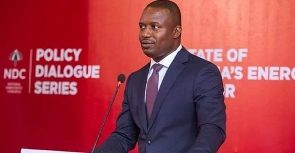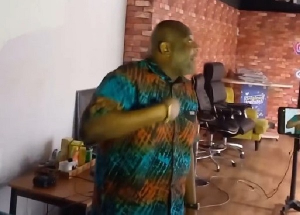The Ranking Member on Parliament’s Mines and Energy Committee has been left alone to fight the chairman, Samuel Atta Akyea, as he distances himself from the contents of the Genser Energy and Ghana National Petroleum Corporation (GNPC) Sales Agreement Report.
The report issued last week by Atta Akyea, according to John Abdulai Jinapor, does not accurately reflect his views and that of the entire Minority in Parliament.
The Committee, has Dela Adjoa Sowah, the Member of Parliament (MP) for Kpando, Emmanuel Armah-Kofi Buah, the MP for Ellembelle, Dr. Kwabena Donkor of Pru East, Wisdom Gidisu of Krachi East, Abdul-Rashid Hassan Pelpuo of Wa Central, Mohammed Mubarak Muntaka of Asawase and Edward Abambire Bawa of the Bongo as members of the National Democratic Congress (NDC) but Mr. Jinapor is the only NDC MP taking the chairman over the transaction described as a “sweetheart contract” from the Akufo-Addo government to Genser.
Coincidentally, the man who initiated the deal during his tenure as Energy Minister, John Peter Amewu, is also on the Mines and Energy Committee to probe his own conduct. As it turned out, he has since approved his conduct.
In a statement issued on Thursday, August 17, Mr Jinapor, urged the public to disregard the report released by Atta Akyea, the MP for Abuakwa South.
“For the avoidance of doubt, I wish to categorically disassociate myself from the content and intents of the said report as it does not accurately reflect my position and that of the Minority in its entirety.”
Firstly, it is true that I have consistently maintained that the GSA is not fairly priced and will result in significant losses to the state. It cannot, therefore, be the case that I disagreed with the position of ACEP/IMANI that the GSA in its current form will result in huge losses to the state.”
“More importantly, it is inaccurate to report that the entire membership of the committee disagreed with my position.”
The Yapei-Kusawgu MP, also said the report purportedly signed and released by the Chairman of the Mines and Energy Committee of Parliament, Samuel Atta-Akyea, contains factual inaccuracies.
Mr. Jinapor concluded that “the current Genser/GNPC gas price of US$2.790/mmBTU is far lower than the actual commodity price of US$4.879/mmBTU as approved by the Public Utility Regulatory Commission.”
“From the evidence, the current Genser/GNPC gas price of US$2.790/mmBTU is far lower than the actual commodity price of US$4.879/mmBTU as approved by the PURC. The critical question the report fails to address is which entity will eventually pay for the price differential of about US$2mmBTU, which runs into billions of cedis over the contract tenure?”
Meanwhile, in a preliminary response to a report issued committee in connection with a joint IMANI – ACEP investigation of a sweetheart gas deal between Ghana’s national oil company, GNPC, and a private company called, Genser, Bright Simons of IMANI, has “in hindsight, IMANI and ACEP should not have participated in these prejudicial proceedings at all”.
He added that “the committee sittings lacked even the most rudimentary elements of due process. There were no clear terms of reference. No proper concept note had been prepared in advance to outline the areas of contention and expected outcomes. No briefings were circulated to witnesses ahead of time to pinpoint matters of emphasis and thus to aid preparation”.
“As everyone now knows, Ghana is in the throes of full-blown national bankruptcy. Unable to pay its debts, the government has reached out to the IMF for a bailout program. Central to that program is an effort to dial down the rate at which the country is accumulating losses in its energy sector due to waste, mismanagement, and cronyism.
The World Bank, which is playing tag team with the IMF on the salvation plan, also has energy sector waste and inefficiencies in its sights. Analysts believe that energy sector liabilities are on course to eventually hit $12.5 billion, more than four times the size of the ongoing IMF bailout. One group within the value chain, independent power producers (IPPs), is already owed nearly $2.3 billion.
When analysts at IMANI and ACEP saw evidence that a private sector operator called, Genser, had secured a deal to obtain gas at a price less than 40% of what the seller, Ghana’s national oil company GNPC, itself says it costs to obtain the commodity, they naturally decided to dig into the legal agreement since it is of such wasteful stuff that the bigger mess has been created.
It was later discovered that another agreement had been signed that will bring total discounts to nearly 75 percent of the commodity value.
After a thorough review of the evidence and extensive interactions with their sources, IMANI and ACEP analysts published a series of essays criticising the arrangements and demanding urgent redress.
A few months following the publication of the IMANI-ACEP concerns, the select committee in Parliament responsible for the mining and energy sectors decided to hold hearings on the matter.
The first to be called on 27th September 2022 was the GNPC. Subsequently, on 18th October 2022, a representative of IMANI and ACEP, appeared before the committee. It was apparent from the outset that the ruling party’s representatives on the committee had made up their minds on the issues.
For example, they spent an hour quarrelling with the representative over the meaning of the “sweetheart” term used in the two organisations’ descriptions of the gas deal. Then the rest of the time interjecting and openly attacking the position of the representative, the very witness they themselves had invited to ostensibly get to the bottom of the issue.
In hindsight, IMANI and ACEP, should not have participated in these prejudicial proceedings at all. The committee sittings lacked even the most rudimentary elements of due process. There were no clear terms of reference. No proper concept note had been prepared in advance to outline the areas of contention and expected outcomes. No briefings were circulated to witnesses ahead of time to pinpoint matters of emphasis and thus to aid preparation.
At any rate, rather than the typical question-and-answer format of a serious parliamentary enquiry, the exchanges mostly ruling party representatives on the committee chastising the IMANI-ACEP representative for the organisations’ views and he, in turn, holding his ground. Nothing by way of serious effort to elicit insights.
Many months after the committee sittings, word reached the two Civil Society Organisations (CSOs) that the chairperson of the committee was doing everything possible to ram through a version of the report cobbled together solely to whitewash the Genser gas sweetheart deal, and was facing resistance from minority/opposition members of the committee.
Unable to obtain consensus, he finally decided yesterday, the 16th of August 2023, to release the report anyway, with a half-hearted concession to the fact of it not being a product of committee consensus.
The report itself turned out to be a rather sad excuse for technical writing. The ranking member of the select committee immediately disassociated himself from the document in its entirety, lamenting the “factual inaccuracies“, “baseless assumptions” and facile conclusions on the central “value for money” issue.
Before delving into the embarrassing details, the reader is reminded of the primary basis of the original concerns raised about the GNPC-Genser sweetheart gas deal: the overpowering musk of regulatory and state capture, the suspicions of insider dealings, and the strong sense of collusion against the interests of Ghana by those who should hold fealty to Ghana’s cause. Now, to the committee “report”.
The 16-page document starts with the customary recapping of the events leading to the committee’s decision to intervene. It then lists the organisations invited to provide evidence and the scanty set of documents relied upon. As if in a hurry to get to its preconceived conclusions, the report then rushes through the evidence, often devoting just two or three sentences to the testimony given by the invited organisations, completely ignoring the vast majority of the highly technical materials and deliberations submitted by the few key expert witnesses it deigned to call.
Below, the reader is invited to consider the recounting of the hours of careful breakdown analysis presented by two important state-owned organisations, Ghana Gas and the Volta River Authority (VRA).
With breathless enthusiasm, the report’s drafters then settled on the highlight of their show: the “findings of fact”, except that this section is actually riddled with confusing premises and inferences as well as a partial reporting of arguments between different members of the committee. Everything but actual facts.
In fact, apart from the two organisations at the center of the impugned deal – Genser and GNPC – no testimony produced during the entire deliberations backed any of these “findings of facts”, much less the hasty conclusions of the committee. Both VRA and Ghana Gas essentially vindicated the positions canvassed by IMANI and ACEP.
You can also watch today's GhanaWeb news headlines in Twi here
You can also watch the latest episode of Everyday People on GhanaWeb TV below:
The invited regulators, namely the Public Utilities Regulatory Commission (PURC), refused to be drawn into the fray by suggesting that the deal between the state-owned GNPC and Genser occurred outside their purview, in the “deregulated market”, whilst the Energy Commission was either not invited or refused to appear. The Energy Ministry, on its part, denied all knowledge of the commercial details of the transaction.
In order not to bore the reader, we will focus on the whitewashing attempts and expose the hollowness of the committee’s work in that regard since these elements most affect the public interest.
At the heart of the IMANI-ACEP case is the simple fact of gas being underpriced by a state-owned producer, GNPC, to the benefit of a favoured private operator, thereby generating losses to the detriment of Ghana, a country saddled today with crippling energy sector debts. As has been explained several times, the GNPC itself has represented to regulators that it cost on average $6.5+ to obtain a unit of gas.
It does not matter that some sources are cheaper than others. In commercial analysis, its weighted average cost should guide how it prices the product for onward sales. Observe carefully that the weighted average cost indicated is for the commodity itself, and that costs for logistics/transportation, such as gas pipelines are presented differently. The raw cost of the gas is what is referred to as the “commodity cost”.
Given this fact, why would GNPC agree to sell the gas to Genser for $2.79 per unit, and commit to a further downward revision to $1.72 per unit in the near future? This was at the core of the IMANI-ACEP complaint.
After its pretend analysis, the committee concluded that this is not an issue because GNPC is also benefiting from Genser by using Genser’s pipelines. No attempt is made to explain how come Ghana Gas was able to secure much higher prices from Genser just before the switch to GNPC without any significant general shifts in market pricing. Why did the so-called pipeline services not matter in the prior arrangement with Ghana Gas?
To get to the bottom of this trickery, one must unpack the justification produced by Genser and endorsed by the committee.
In simple terms, the gas ought to cost Genser $6.08, however, Genser has provided a pipeline for the use of GNPC and charged $3.29 for it. Thus the net effect on each unit of transaction is a discounted final price of $2.79 per unit of gas bought. There are a million and one reasons why this explanation makes no sense, quite apart from the total lack of interest on the part of the committee to take and review testimony of pipeline rate-making methodologies, value for money, and gas trading best practice.
First, the netback is tied to each unit of gas sold to Genser itself not necessarily to volumes of gas belonging to GNPC that transits through the Genser pipelines, potentially for sale to third parties. There is absolutely no evidence before the committee of GNPC using the pipeline to transmit any gas to any customers other than Genser on which it may have made money by charging those customers the transport tariffs that would have otherwise gone to Genser were it not for this strange barter trade.
Second, the $3.29 cited comprises costs for transiting gas through both trunk and branch pipelines. What is crazy about this arrangement is that Genser’s pipeline complex has been designed to enable Genser deliver gas it has bought from GNPC to its own customers.
They are effectively Genser’s distribution network. Whatever investments Genser has made into those pipelines are amply recouped from transport margins embedded in the final power prices Genser obtains from its predominantly gold mining customers. What exactly is the business of GNPC subsidising the pipelines Genser has built to enable it operate its business model?
Third, building on the previous point, GNPC’s responsibility as a bulk seller is to deliver gas to Genser at a transmission terminal, or, as they say in the parlance, a metering and regulation station. The pipelines leading to that terminal would be GNPC’s responsibility.
Indeed, GNPC utilises public owned infrastructure to deliver gas from their ultimate source to this point of contact with Genser’s pipelines. The transportation costs of that phase are not accounted for anywhere in the model being championed by the committee. The logic being forced on the nation is that after taking delivery of the gas and transporting it through its own pipelines to locations of its own choosing, Genser must now be compensated for the trouble.
This is akin to a trader from Techiman asking for a 60% discount on goods brought from Tema port and on sale in Kumasi because, in her view, she needs to offset the cost of the vehicle transporting the goods to Techiman.
Fourth, the committee, in its haste, in its total disregard for fact-based technical analysis, and in its burning desire to “save Genser and damn the CSOs”, decided to rely entirely on hypothetical data and scenarios of what GNPC stands to gain if it utilises the so-called reserve capacity in Genser’s pipelines.
Note that all this is hypothetical stuff. The committee cannot evade the basic question: on what basis was the $3.29 pipeline tariff (which has been used to discount the acknowledged real price of $6.08 per unit of gas) computed, and by what process was it determined to be fair when as presently configured the Genser pipelines simply represent the downstream distribution network of a company based on current customer locations?
How much do other gas wholesalers with pipelines charge for pipeline transportation? And why wasn’t real market data used to benchmark the $3.29 figure? Has GNPC ever transported volumes of gas sufficient in value to offset the tens of millions of dollars of discounts obtained by Genser since 2020?
As analysts have already argued, Ghana Gas has the largest pipeline network in Ghana, and its average transportation tariffs on pipelines with a greater combined length than Genser’s fall below the PURC-regulated threshold of $1.288.
Thus, even if one were to grant the preposterous contention that Genser needs to be compensated for using its own distribution pipelines to transport gas to its own customer sites to generate power, there is no reason why the net back charge shouldn’t be, say, $0.919, as Ghana Gas prices transmission on some of its major routes, rather than the $3.29 preferred by the committee.
The argument that GNPC has been saved cost because it is not delivering the gas to plant gate using its own infrastructure is, also, wholly bogus since should that have been the case, GNPC would simply have added the transport margin to the price it charges Genser, bringing the cost to nearer $7.1 rather than $6.08.
Fifth, any kind of barter arrangement based on the notion that Genser is a general pipeline transporter capable of delivering third-party gas on behalf of GNPC so that it can offset the resultant charges against the commodity gas delivered to it (whether or not the volumes of gas delivered to it exactly matches those delivered to third-parties) would be based on patent illegality as Genser does not have the requisite licenses to operate as a general transmission utility.
It has been tolerated on the basis of using its own distribution network to service gold mines in the unregulated power sector. The committee, and in particular its chairperson, should not become an enabler of illegal conduct in Ghana’s already fraught energy sector.
To the extent that the position taken by the committee in its ill-timed, ill-judged, and ill-considered report does not have Ghana’s interest at heart, activists will not relent in continuing to cite the GNPC-Genser case as one of the reasons they are highly sceptical of the ongoing IMF/World bank – driven effort to reform Ghana’s energy sector. And, indeed, why they remain sceptical of the viability of the overall undertaking to save Ghana from the bowels of bankruptcy.
It follows clearly from all the preceding analyses that the risk of the GNPC-Genser deal leading to $1.5 billion in accumulated losses is now more elevated than ever due to the ill-advised findings of the select committee’s report. One cannot sugarcoat such an alarming prospect. The only word fitting for the occasion is: unpatriotic. May those whom the cap fits, wear it.
Business News of Monday, 21 August 2023
Source: theheraldghana.com

















